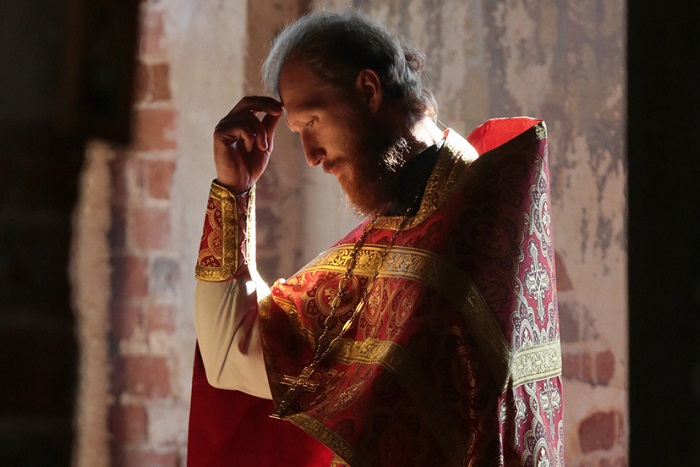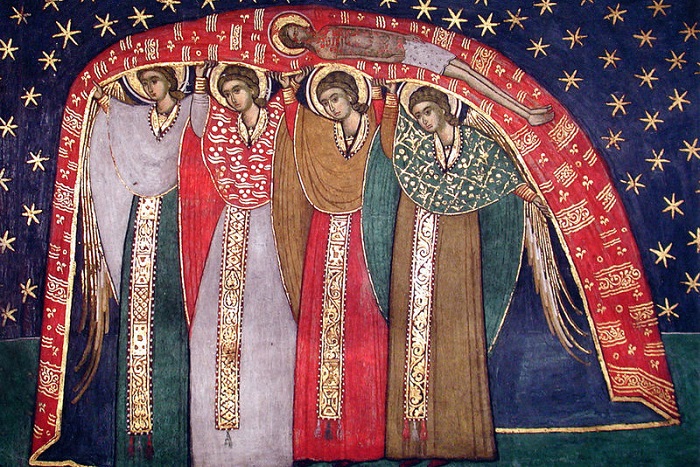According to Fr. Alexander Schmemann, Orthodox Christianity is not a religion. In his For the Life of the World, he wrote, “Christianity is in a profound sense the end of all religion… Nowhere in the New Testament is Christianity presented as a cult or as a religion. Religion is needed where there is a wall of separation between God and man. But Christ, who is both God and man, has broken down the wall between man and God. He has inaugurated a new life, not a new religion.”
This concept is not new, but is found throughout the New Testament. Christ Himself, though firmly anchored in the Second Temple Judaism of His day and keeping the Jewish Law, pointed to something beyond it—the “new life” to which Fr. Alexander referred, a life given by the Spirit (John 3:5-8, 7:37-39). His followers would no longer need a temple with its priesthood and sacrifices to commune with God, whether that temple were on Gerizim or Jerusalem (John 4:21-23); His own flesh would be the new Temple (John 2:21). In that new life, Sabbath restrictions would no longer be ultimate (Matthew 12:16, John 5:8-11); nor would the food laws restricting certain foods (Mark 7:19). While living as a Jew faithful to the Old Covenant, Christ offered a new wine, a drink too potent to be contained within the old wineskins of that Covenant. The new wineskins of the Kingdom would be required (Mark 2:22).
This fundamental insight is the source of St. Paul’s rejection of Judaism. Judaism, though divine in origin, was now no longer adequate because Judaism was a religion. Like all religions of the world, it was characterized by certain fundamental concepts and dichotomies. It had a priesthood which offered animal sacrifices—and the rule that priests alone could offer these cultic sacrifices. It knew of sacred space—the courts of the Mosaic shrine, and later of the Temple, and places to which only certain persons could go (such as the inner Holy of Holies). It had certain categories such as “holy-clean-unclean”, and said that the unclean could not offer holy sacrifices until they were cleansed. It also used the category of “clean-unclean” for certain foods, outlawing the consumption of certain animals. Using a lunar calendar, it declared certain days were holy—i.e. holy in themselves—days such as the Sabbath, the full moon, the Passover. These things were not unique to Judaism. All religions of the world used the same basic categories. They were not categories of Judaism, but of religion itself. Religions might differ about which days were holy and which foods were allowed and who was allowed to function as a sacrificing priest, but they agreed that such categories were basic and constitutive.
Such categories St. Paul termed stoicheia (Galatians 4:3, Colossians 2:8, 2:20). They were not wrong in themselves, but represented a retreat and renunciation from the new life given freely in Christ apart from them. Thus St. Paul taught that it did not matter whether or not one regarded a particular day as intrinsically holier than another (Romans 14:5), and that no food was unclean in itself (Romans 14:14, 1 Timothy 4:4-5). He regarded the Galatians’ adherence to the Jewish calendar as an alarming development (Galatians 4:10-11), and said that the Colossians’ submission to the decrees about unclean foods was unworthy of those who “had died with Christ to the stoicheia of the world” (Colossians 2:20-23). Religion was for the spiritually immature, for children, those who were no better than slaves (Galatians 4:1-3). But now that Christ had come to redeem us, we were such slaves no longer, no longer under any religion with its fundamental categories. In Christ mankind comes of age, and no longer needs religion. We can have the Holy Spirit instead, who is the pledge and participation in the powers of the age to come.
It is easy to misinterpret Christianity as a religion like any other. For all major religions have books (the Torah, the Bible, the Quran, the Bhagavad Gita); they have officiating clergy (Rabbis, priests, imams), they have buildings in which to worship (synagogues, churches, mosques, temples). There is much commonality among their teachings—all say that kindness is preferable to cruelty, and that people should not murder each other or commit adultery. It is too easy therefore for those studying Comparative Religion to imagine that Christianity is comparable to the others. But, as we have seen, it is not so. The things which seem to be the same and comparable to things in other religions really are not. There is a superficial similarity, of course. But the inner and essential reality is different, just as there is a superficial similarity in the bodies of all men, and the real difference between them is found in their souls.
One of the apparent similar things between Christianity and religion is in the fact that both Christianity and the religions have a class of people who officiate when everyone comes together, and who perform certain set liturgical rites. Often the term for them is “priests”. In Judaism and Greco-Roman paganism, their function was especially located in the offering of sacrifices. It is significant, therefore, that the term “priest” (Greek iereus; Hebrew cohen) is never applied to the Christian clergy. They are called “elders/ presbyters” (Greek presbyteros) or “overseers/ bishops” (Greek episkopos) or “shepherds” (Greek poimen)—but never priests. The Jewish priests are referred to by that term (Acts 6:7), but not the Christian clergy. In the Church that title is reserved for Jesus Christ alone—He alone is the first, true, and only priest in the Church. And one can see why—a priest is one who offers a sacrifice, and the only true sacrifice that avails to save and transform is the sacrifice of Christ’s body upon the Cross. All the other sacrifices of the Law were mere prophecies, pledges, prayers for a cleansing that would only come later. The Jewish priesthood—and, taking a wider more global view, all the pagan priesthoods of the world’s religions—found fulfillment in Him. He is the true priest, who offered Himself as the true sacrifice (Hebrews 8:1-5). Those who have liturgical or pastoral responsibility in His Church are not, properly and strictly speaking, priests. They do not offer a sacrifice like the other Jewish and pagan priests offer sacrifices, for the only sacrifice we need has already been offered.
It is true, of course, that the term “priest” has been applied to the celebrants of the Eucharist—first to the bishop (when he was the main celebrant) and then to the presbyters (when they later took over this function). That poetic attribution of title was not incorrect, for it was based upon the insight that the celebrant offers by anamnesis or commemoration the one true sacrifice of Christ. The celebrants were thus priests not in their own right, but by virtue of their role as liturgical heads of the royal priesthood, the Body of Christ our high priest. Referring to them as “priests” meant only that they presided over the Church’s sacrificial anamnesis, not that they slaughtered animals and offered them up with their blood in sacrifice upon stone altars. (That was the point of calling the Eucharist “a bloodless sacrifice”.) Christianity is not a religion, and its officiating clergy are not strictly speaking, priests. Their priesthood consists of their calling to manifest through the Church’s corporate liturgical worship, the true and saving sacrifice of Jesus Christ. They are priests, not in their own right, but through their ordained participation in the heavenly priesthood of their Master. The coincidence of title between the Christian priests and the priests of the Jewish religion should not mislead us into thinking that Christianity is just another religion. Christianity is not a religion, but the sacramental presence of the incarnate God on the earth.





What is the point, defending a word, religion? When we had no priest, divine liturgy was cancelled. My church calendar marks feasts and fasts. A Catholic, who also believes the bread and wine become the Body and Blood of Christ, cannot partake. And now, a new schism which separates us from our Greek Orthodox brothers. A pointless and I think erroneous article.
Please do not degrade your otherwise excellent web-page with this nonsense. Farley and Schmemann are not good teachers of Orthodoxy.
What would you say? to the Recusant SedeVacantIst researchers Michael Bizzaro and Victoria DePalma who say Christianity is the Only Religion based on the fact that the Sacred Bible appears to use the words “religion” [Exodus 12:26,43; 29:9; Leviticus 7:36; 16:31; Numbers 19:2; 2 Machabees 8:1; 14:38; Acts 26:5; Galatians 1:13–14; Colossians 2:18; James 1:26–27], “rites” [Genesis 34:22; Exodus 12:5,17; 18:20; 29:7,41; Leviticus 8:34; 12:5; 14:2; 23:37; Numbers 3:26; 4:43; 8:7; 9:12; 15:14; 19:20; 28:8; 3 Kings 18:28; 4 Kings 17:8; 17:26; 1 ParaLipoMenon 23:13,32; 24:19; 29:21; 2 ParaLipoMenon 4:20; 8:14; 28:3; 29:34; Judith 14:6; Esther 9:23; Ezechiel 43:18; 2 Machabees 4:10; 11:24], etc. or did religious people “corrupt” the Sacred Bible with these words like they did with the words “jew”/”jews”, “rabbi”/”rabbis”, etc.?